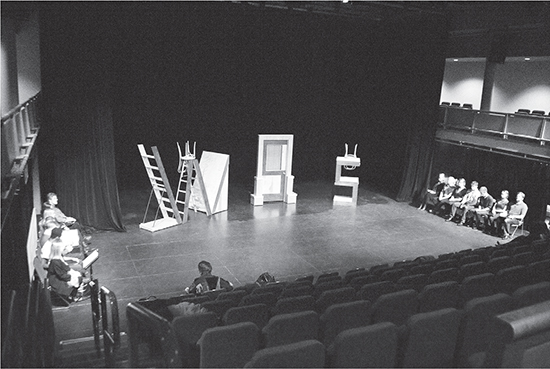
In 2010, as I was reading the first set of short plays by a UNC Writing for the Screen and Stage class, I was struck by the ambition, depth of vision, and singular voices of these undergraduates. The experience encouraged me to imagine a play festival where student writers could participate in a process rarely experienced on their level: a collaborative, developmental environment led by accomplished faculty and working professionals. This was the birth of the Writing for the Screen and Stage Long Story Shorts One Act Festival, in which I select a group of short plays from the program’s introductory class and lead the playwrights through a succession of drafts prior to the first day of rehearsal. The plays are then further polished by the ideas of the directors and actors and, in some instances, by the unexpected demands of reality.
The festival premiered in the fall of 2011 on a flexible set that spells out WSS, the program’s initials. The first two years of the festival featured full productions of six plays. In 2013, I changed the format to eight plays performed as staged readings. This reduced the rehearsal and production demands, while increasing the number of plays that could be showcased. The intention, in either form, has been to create an experience that mirrors the demands of the professional world, thus preparing students to better handle its challenges.
The plays in this volume were selected from the festival’s first five years: 2011 to 2015. As of this writing, forty-four have been presented to audiences at the Kenan and Studio 6 theatres on the UNC campus. I do not stipulate style or impose constraints. Some are one-scene, one-set plays. But others are defined by theatrical devices or have multiple scenes, allowing them to be staged in a variety of ways. What I find encouraging is that nearly all of them were written by first-time playwrights. It is my expectation that, as these young writers continue to develop their craft and collaborative skills, they will honor the Writing for the Screen and Stage Program and the University of North Carolina with their success.
Dana Coen
Director, UNC Writing for the Screen and Stage Program

Long Story Shorts dress rehearsal, October 2015. Set design by Rob Hamilton. Set construction by Ray Dickie.